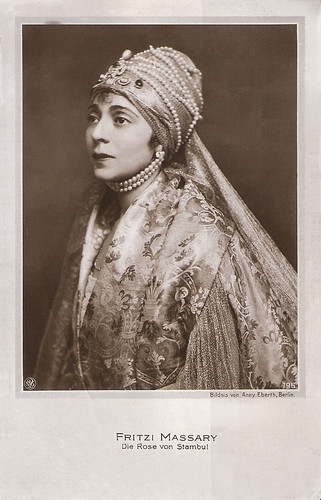
German postcard by NPG, no. 795. Photo: Anny Eberth, Berlin. Publicity still for Die Rose von Stambul/The Rose of Stamboul (Felix Basch, Arthur Wellin, 1919).
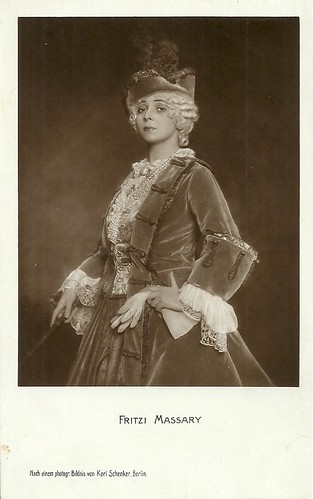
German postcard. Photo: Karl Schenker, Berlin.
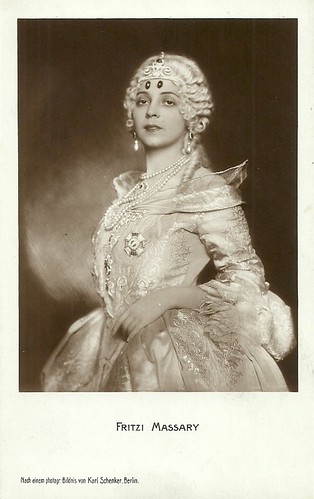
German postcard. Photo: Karl Schenker, Berlin.
Reigning over the Berlin stage
Fritzi Massary was born Friederike Massaryk in Vienna in the Austro-Hungarian Empire on 1882. She was the eldest of three daughters of a Jewish family, and her father was a businessman. Her parents, and especially her mother, encouraged her talent via singing lessons, with the result that their daughter, now renamed Fritzi Massary, received her first engagement in a small part at the Landestheater in Linz in 1899/1900.
In 1900 she appeared in another minor role at the Carl Schultze Theatre in Hamburg, returning to Vienna in the following year and being employed at a summer theatre, Danzer’s Orpheum, until 1904. At around this time she was baptised as a Protestant and in 1903 she gave birth to a daughter, Liesl. She had her first sensational success in revue at the Metropol-Theater in Berlin in 1904. She refined her vocal abilities in the next years and soon belonged to the most elegant performers of her time.
In 1907, she made her cinema debut for Messter Film in the short 'tonbild' (sound picture) Komm du kleines Kohlenmädchen (1907) opposite Joseph Giampietro. The next year, she made several more of such short films with a song on a sound disk for Deutsche Bioscop GmbH, like Trallala Lied/Trallala Song (1908), Donnerwetter, tadellos/Gosh, faultless (1908) with Henry Bender, and Auf ins Metropol/On to the city (1908). For Deutsche Film, she made Viola (1912).
On stage, her real breakthrough occurred in 1911, when she appeared as a guest artist at Max Reinhardt’s Künstlertheater in Jacques Offenbach’s La Belle Hélène, alongside Maria Jeritza. From then on Massary reigned over the Berlin stage, which was at the time the centre of cabaret, revue and operetta. Among the works created especially for her was the operetta Die Kaiserin (The Empress) by Leo Fall (1915). Under Bruno Walter she sang the title role in Franz Lehar’s Die lustige Witwe (The Merry Widow) and Adele in Johann Strauss’s Die Fledermaus (The Bat). During World War I, she performed for the soldiers of the Imperial German Army in theatres in occupied Belgium.
In 1915 she appeared in the silent film Der Tunnel/The Tunnel (William Wauer, 1915) starring Friedrich Kayßler and Hermann Vallentin. It was the first of several film adaptations of Bernhard Kellermann's 1913 novel Der Tunnel about the construction of a vast tunnel under the Atlantic Ocean connecting Europe and America. The film was made by Paul Davidson's PAGU production company, with sets designed by art director Hermann Warm, five years before he designed Das Cabinet des Dr. Caligari/The Cabinet of Dr. Caligari (Robert Wiene, 1920). Massary’s later films were Die Rose von Stambul/The Rose of Stamboul (Felix Basch, Arthur Wellin, 1919) and Narrentanz der Liebe/Mie (Arthur Wellin, 1920), opposite Ernst Stahl-Nachbaur.
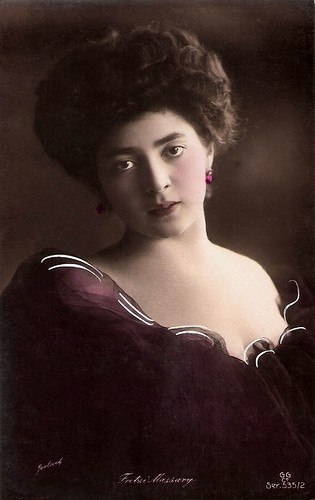
German postcard by G.G. & Co., Serie 535/2. Photo: Gerlach.
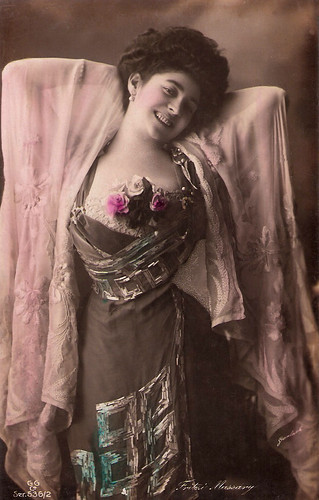
German postcard by G.G. & Co., Serie 536/2. Photo: Gerlach.
A butt of anti-semitic propaganda
Fritzi Massary was closely associated with the composer Oscar Straus, creating roles in six of his operettas. In 1920, she worked with Strauss on the hit Der letzte Walzer (The Last Waltz). Her biographer Robert Wennersten explained her popularity in an interview with Kevin Clarke: “Her singing voice was not exceptional, but her delivery of the songs certainly was. Take “Oh-la-la” from Der Letzte Walzer: every time those syllables came around she sang them differently, and every variation was funny or slightly salacious.”
Massary was so popular that she had an important impact to the fashion of her times. At the height of her career – between 1918 and 1932 – Massary asked for and was given complete control over her productions. Everything – the supporting cast, the costumes, the sets, the props and lighting – was subject to her approval.;Massary’s career in Germany came to an abrupt end when she became a butt of the anti-Semitic propaganda because of her Jewish marriage with actor Max Pallenberg.
In late 1932 the couple left Germany, shortly before the Nazis seized dictatorial power in a paramilitary revolution and declared a Third Reich. The couple travelled through Austria and Switzerland, but in 1934 Max Pallenberg died in a plane crash in Karlsbad. Fritzi had now lost everything. She moved to London, where she became friends with Noël Coward and starred in his theatrical musical Operette in 1938. In February 1939, shortly before the outbreak of World War II, she moved to Beverly Hills, California to join her daughter’s family, and lived there among other exiles such as Elisabeth Bergner, Fritz Kortner, Ernst Lubitsch, Thomas Mann and Max Reinhardt.
She put an extended effort into continuing her career, going to New York to look for Broadway roles and talking to Hollywood directors about film roles. To no avail, unfortunately. From then on, she focused on her garden and her dogs. Beginning in 1952, she regularly spent summers in Germany. In 1957, Germany honoured her with the Großes Bundesverdienstkreuz (Grand Cross of Merit).
She continued to reside in Beverly Hills until her death in Los Angeles in 1969. Fritzi Massary was married twice, first to an eye doctor Bernhard Pollack in 1914. Massary's second marriage was to the Austrian actor Max Pallenberg, from 1917 till his death in 1934. With Karl-Kuno Rollo Graf von Coudenhove, she had her only child, Elisabeth Maria Karl (called Liesl) (1903–1979). Liesl later married the author Bruno Frank. Though Coudenhove was Liesl's father, Massary was never married to him.
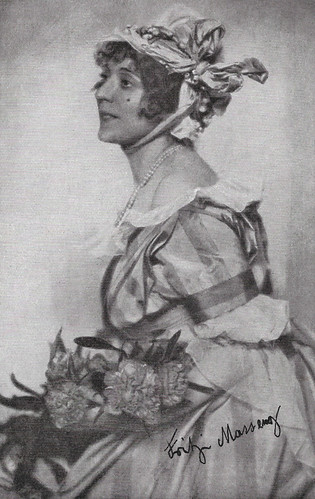
German postcard by Genossenschaft Deutscher Bühnen-Angehorigen, Berlin / Verband der konzertierenden Künstler Deutschlands, Berlin. Photo: Karl Schenker, Berlin.
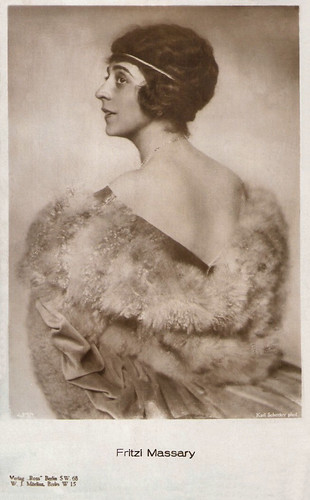
German postcard by Ross Verlag / W.J. Morlins, Berlin, no. 427/1, 1919-1924. Photo: Karl Schenker.
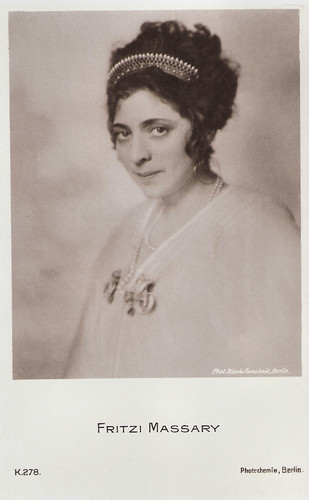
German postcard by Photochemie, Berlin, no. K. 278. Photo: Nicola Perscheid, Berlin.
Sources: Beatrix Borchard (Jewish Women’s Archive), Kevin Clarke (Operetta Research Center), Stadtmuseum Berlin (German), Wikipedia (English and German) and IMDb.
This post was last updated on 23 October 2023.
No comments:
Post a Comment